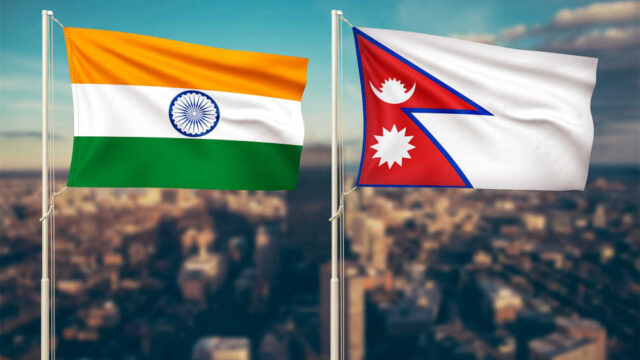The 1950 India-Nepal Treaty of Peace and Friendship forms the foundation of the relationship between the two countries. Nepal has been an important neighbour of India and that is why it holds great significance in the country’s foreign policy. The two countries not only share an open border and unhindered movement of people, but they even have close bonds through marriages and familial ties. But the establishment of diplomatic relations between Nepal and China and its growing influence in Nepal has resulted in declining of India-Nepal relations.
Since July 2021, the new Prime Minister of Nepal Sher Bahadur Deuba, along with his cabinet, has been making efforts to reach out to the leadership in India and resume the talks in several sectors, including railways trade, hydropower, culture, and Covid-19. This effort has been highly appreciated by India as well. To put more effort, a high-level delegation representing the ruling Nepali Congress arrived in New Delhi on 8th October this year. The delegation was led by the former Foreign Minister of Nepal Prakash Sharan Mahat along with Nepal political leaders Udaya Shumsher Rana and Ajay Chaurasia to interact with the leading figures of the country. The delegation held meetings with External Affairs Minister S. Jaishankar and BJP President JP Nadda. During a reception in Delhi, the delegation expressed that the Nepali Congress aims to cement ties with India and stated that the Kalapani issue had reached a consensus.
Further in a statement that was tweeted by the External Affairs Minister Dr S Jaishankar said that “Pleased to welcome Nepali Congress delegation visiting India at the invitation of @BJP4India. Appreciate the discussion with Shri Prakash Mahatji and delegation.”
The visit came in the backdrop of the visit of Vijay Chauthaiwale to Kathmandu. He heads the Foreign Affairs Department of Bhartiya Janta Party (BJP). During the visit he had met with Prime Minister Sher Bahadur Deuba, Maoist Party chief Prachanda, Madhesh leader Mahanta Thakur, and opposition leader KP Sharma Oli among other leaders.
In recent times, Nepal has brought down 35 agreements signed under Belt and Road Initiative (BRI) TO 9 and the Trans-Himalayan Railway Connectivity Project connecting Tibet to Kathmandu is present only in principle now. However, the removal of pictures of Indian leaders from the Foreign Ministry website is something hard to be forgotten.
Further on 28th October 2021, the fourteenth meeting of the India-Nepal Bilateral Consultative Group on Security Issues (BCGSI) was held in Bengaluru. During the meeting issues associated with mutual security concerns, training and capacity building requirements of the defence forces of Nepal were discussed. Also, discussion about cooperation in disaster management, requirements of Nepal Army for various defence stores, exchange of experts/instructors, exchange of high level and functional level visits, joint expeditions and adventure sports activities and information sharing was held. The meeting was attended by Anurag Srivastava, Joint Secretary (North), Ministry of External Affairs and the Nepalese delegation was led by Tirtha Raj Wagle, Joint Secretary (South Asia), Ministry of Foreign Affairs. Also, other officials from ministries of defence, foreign affairs, home affairs, Directorates of the Indian Army and the Nepal Army and the National Disaster Management Authority were present at the meeting.
These continuation of high-level visits as well as meetings are an important contribution by the present government towards building back the relationship between the two countries. With the importance of Nepal in the national security, regional and international politics and also with the growing influence of China, it becomes important for India as well to establish good talks with Nepal too.









